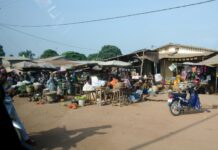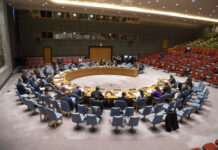Photo credit: DiasporaEngager (www.DiasporaEngager.com).
America can do more to create stability and foster democracy
By Pierre Espérance, Foreign Affairs —
Haiti is finally addressing its profound crisis in leadership. For more than a dozen years, Haiti’s leaders have dismantled democratic institutions and relied on corruption and gangs to maintain their control. After President Jovenel Moïse was assassinated in 2021, Ariel Henry, who was deeply unpopular among Haitians, became prime minister with the help of international support. His tenuous hold on power led to increasingly brazen acts of sabotage and violence by astonishingly well-armed and increasingly independent street gangs jockeying for territory and dominance.
In early March, the gangs united to declare war on the state, attacking the airport, police stations, and government buildings. On March 11, Henry announced he would resign after gangs shut down the main airport and blocked him from returning to Haiti after a trip to Kenya. Now, the gangs are stepping in to fill the power vacuum. They claim they represent the people, but the reality on the ground tells a different story. In at least one neighborhood of the capital, Port-au-Prince, gangs fighting the police have gone house to house telling people to unlock their gates so that gang members can, at any moment, run inside and use the residents as human shields.
Across Port-au-Prince, armed groups are looting businesses and burning down houses. Their violence touches anything within reach. As well as government buildings, gangs have destroyed or severely damaged a center for children with disabilities, pharmacies, and medical clinics. In most of the capital, banks are closed, so people cannot get money; hospitals are not operational, so people cannot receive treatment; and police officers are not patrolling the streets, so there is no one to call for help. According to the United Nations, famine is a step away for 1.6 million of Haiti’s 11 million people.
Yet this could also be a moment of transformative change in Haiti. Since Henry stepped down, feverish negotiations have been underway among Haitian leaders to determine the parameters and makeup of a transition government. After years of frustration and despair, there is hope that Haiti could finally create a government that is committed to the country’s democratic future.
But this opportunity can be realized only if the United States, which has long had a deciding role in Haitian politics, works with Haitian democrats carefully and constructively, and avoids repeating the mistakes it has made in the past. That means not getting into bed with criminals and not backing corrupt leaders. The United States has ceded the role of broker in negotiations to the Caribbean Community (CARICOM), a regional trading bloc. But the current process risks putting in power people with deep ties to the gangs. The United States should take a more forceful and prominent role to support Haitian leaders on the presidential council and ensure that the prime minister and cabinet ministers who take charge in the new government are people of integrity, capacity, and skill who have no ties to armed gangs. An international security force may be necessary to install the transitional government and confront gang control of the capital. The gang leaders cannot be allowed to write the next chapter for Haiti.
Out of the ashes
Henry came to power after the shocking assassination of Moïse in July 2021. After his murder, many Haitians pushed for a neutral transition government to guide their country to free and fair elections. But international support brought Henry—who had been named prime minister by Moïse shortly before his death but not sworn in—to office. He promised to hold new presidential elections and to create a more representative governing structure—but accomplished neither. The U.S. government stood by him, however, resisting the call from civil society for a more broadly based government committed to cleaning up institutions, confronting gangs, and mounting fair elections.
Haiti has had successful transition governments twice in the past 40 years. The first was in 1990, after a series of military leaders failed to hold elections. The transition was led by Ertha Pascal-Trouillot, a justice of the Haitian Supreme Court. The second was led by Boniface Alexandre, another Supreme Court justice, who stepped in after Jean-Bertrand Aristide was ousted from power in 2004. Alexandre served as president until 2006. Both times, the transition governments were made up of unifying figures who could stabilize the country. They mounted elections that inspired popular participation and produced uncontested results. But U.S. policymakers, who helped guide these governments, never focused on the long-term institution building that would prevent political collapse. Instead, they prioritized attracting foreign investment to Haiti and supporting the programs of international nongovernmental organizations (NGOs)—most of which eventually failed, along with the Haitian state.
Now, Haiti has another opportunity at building a transition government that could give the country a fighting chance at a democratic future. CARICOM-brokered talks in Jamaica and over Zoom yielded a presidential council that includes democracy advocates as well as political parties affiliated with the gangs—uneasy bedfellows. Now, as this new leadership selects a prime minister and a full slate of cabinet ministers, the power sharing must stop.
Criminals need not apply
Candidates for prime ministerial and cabinet posts must be people of integrity who represent Haitian society. Such a requirement might seem obvious, but it would be a new direction for Haiti, whose government has become entwined with criminality. The United States and Canada—which has also played a substantial role in Haitian politics—have both sanctioned a long list of Haitians for corruption, drug and arms trafficking, and material support for gangs. That list includes two former Haitian presidents, three former prime ministers, four senators, and various other top officials. No one on an international sanctions list deserves a seat at the table.
A September 2023 report to the UN Security Council found that Michel Martelly, Moïse’s predecessor and still a major player in Haitian politics, created one gang and funded and armed others while in office in order to expand his control and power. And according to a report by Harvard Law School’s International Human Rights Clinic, top aides to Moïse participated in gang massacres in 2018 and 2019in opposition neighborhoods planning protests against government corruption. Henry has also empowered leaders affiliated with gangs, including a police chief, two government ministers, and a customs official.
With politicians in their corner, gangs expanded their control in Port-au-Prince in 2023. According to a January UN report, the number of people killed by gangs more than doubled from 2022 to 2023, increasing from roughly 2,000 to almost 5,000 victims. This is not random violence, but politics by deadly means.
Gang leaders cannot be allowed to write the next chapter for Haiti.
The same bandits that have committed crimes against fellow Haitians are now angling for power in the transition. Gang leader Jimmy Chérizier, widely known as Barbecue, who is responsible for civilian massacres, has held multiple press conferences over the past several weeks to establish himself as a legitimate political revolutionary leader. Guy Philippe, freshly released from a U.S. prison for money laundering related to drug trafficking, has amassed a small group of armed forces and has gained limited political support. These criminals and their deputies cannot be allowed any role in governance.
Needless to say, it will be difficult to dislodge the gangs from the territory they control. The Haitian police force has collapsed and cannot confront gangs alone. Haiti needs immediate interim international security support to confront the gangs and help install the transitional government. This force could quickly end gang control of the airport, the roads surrounding Port-au-Prince, and key state buildings. It could buy time for the Haitian police to reconstitute. A functional police force and judicial system, with independent vetting of officers and officials with ties to corruption and gangs, will be critical to ending gang control long term. In the medium term, if gangs are no longer protected by politicians, they will lose power. If the state becomes more functional, and provides services, jobs, and community policing for poor neighborhoods, young people will have options beyond gang membership and will develop more respect for state authority. Years of impunity enabled the gangs’ crimes against humanity. At this moment, while gang members are currently committing atrocities, talking about amnesty would encourage further crimes—and would be an insult to their victims.
Some observers worry that Haitians are so desperate after years of being terrorized that they will tolerate any leader—including a gang leader—who promises to stop the violence and restore some order. This is simply not true. The danger in the streets has made it impossible for citizens to gather to demand peace and democracy. But a vigilante movement has been one clear expression of Haitians’ revulsion for gangs. Some of its methods are abhorrent: people have executed gang members and even burned them alive. Yet these are acts of retaliation for a collective sense of an abominable injustice committed with impunity. Today, across the capital, regular citizens are building barriers to prevent gang members from moving through the city and entering their neighborhoods. This is not popular support for gangs—this is popular defense against them.
New blood
The CARICOM negotiations have so far yielded an agreement for a transition government led by a prime minister and a presidential council with seven voting members along with two observers. The voting members of the council include a democracy advocate, a private-sector representative, a representative of a long-standing political party—and leaders of assorted discredited political parties that have held power over the past dozen years and helped run Haiti into the ground. There is a danger that the appointment of this motley group has already alienated the talented, honest, and apolitical Haitians the country needs most to work for this transition government.
Given the unwieldy seven-person presidential council, the prime minister must be carefully selected, as that person will name the cabinet and execute decisions. Whoever the presidential council chooses must be an experienced professional without any criminal history or affiliation. The ideal person would be a neutral technocrat, highly skilled at building consensus and able to initiate unpopular actions.
The new government’s first priority will be security. In October, Kenya agreed to lead a multinational security force and send 1,000 police officers to Haiti to help restore law and order. The Kenyan government has said the force will not deploy until a transition government takes office. In any case, the Kenyan-led force is only a tourniquet and obviously cannot be the answer for Haiti’s long-term security. For that, the country needs a strong, well-equipped police force without ties to corrupt politicians and gang leaders. Currently, rank-and-file police officers are revolting against the chief, who they say is tied to gangs. The police force needs new leadership to function effectively and collaborate with international forces. Haiti also requires a functional judiciary that can try to prosecute gang members, as well as secure ports to stop the flow of arms.
Famine is a step away for 1.6 million of Haiti’s 11 million people.
Previous transition governments in Haiti served as effective temporary course correctors. But they did not create sustainable change. To prevent yet another downward spiral, the United States must be invested in Haiti’s long-term democratic processes. That means rebuilding key state institutions, including the justice system; it may take a generation to achieve full functionality, but that must be the central goal of U.S. efforts. It also means avoiding the standard practices of relying on the U.S. Agency for International Development and big, international NGOs and instead investing in the development of locally based NGOs, professional associations, and unions.
If the United States and CARICOM do not get this next chapter right—and stand by leaders who are credible, are legitimate, and have the bureaucratic experience to put the Haitian state back on track—the cycle of violence and dysfunction will not end.
For several years, U.S. officials said they stuck with Henry to avoid instability. Civil society leaders kept saying that Henry’s illegitimate and gang-enabling rule was the very thing promoting that instability. After years of backing corrupt and undemocratic leaders, the U.S. government has a chance to back Haitians promoting democracy and the rule of law. If it does so, the United States can help Haiti exit this hellscape at last.
Pierre Espérance is Executive Director of the National Human Rights Defense Network in Haiti.
Source: Foreign Affairs
Featured image: Former police officer and gang leader Jimmy “Barbecue” Cherizier in Port-au-Prince, Haiti, March 2024 (Ralph Tedy Erol, Reuters)
Source of original article: The Institute of the Black World 21st Century (ibw21.org).
The content of this article does not necessarily reflect the views or opinion of Global Diaspora News (www.GlobalDiasporaNews.com).
To submit your press release: (https://www.GlobalDiasporaNews.com/pr).
To advertise on Global Diaspora News: (www.GlobalDiasporaNews.com/ads).
Sign up to Global Diaspora News newsletter (https://www.GlobalDiasporaNews.com/newsletter/) to start receiving updates and opportunities directly in your email inbox for free.

































